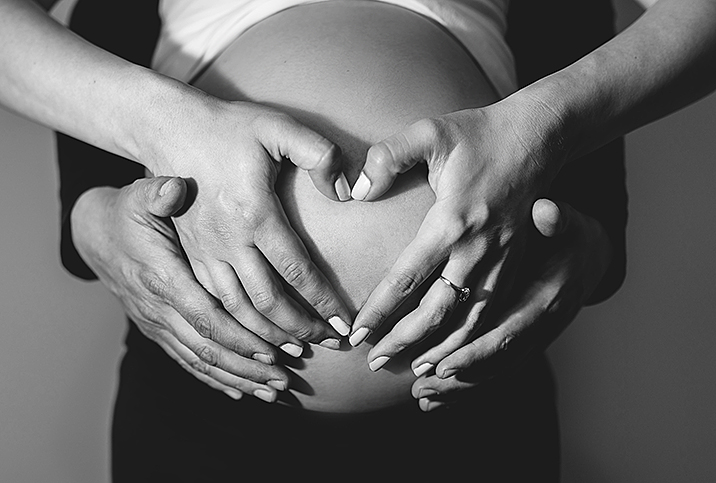Your Morning Sickness Could Be Something More Serious

Six weeks into her first pregnancy, Jenni Gritters thought she had the flu.
"I had a pretty rough first pregnancy," said Gritters, a business coach in Bend, Oregon, and co-founder of The Writers' Co-op, a podcast and community for freelance writers. "I basically didn't get better. I threw up multiple times per day and the nausea was pretty consistent."
Morning sickness—waves of nausea that, despite its name, can hit at any time of day—typically subsides as women head into their second trimester. But for some women, the morning sickness never ends and may actually be a serious condition called hyperemesis gravidarum (HG).
The condition is a potentially life-threatening pregnancy disease that may cause weight loss, malnutrition, dehydration, and debility due to severe nausea and/or vomiting, and may cause long-term health issues for mother and baby, according to the HER Foundation, a nonprofit organization providing support, research, advocacy and education about hyperemesis gravidarum.
"I don't have a family history of hyperemesis, so it was a surprise," Gritters continued. "I attributed the nausea to the fact that I was pregnant with twins, but when we lost one of them at 12 weeks, my symptoms didn't go away."
Gritters is now 22 weeks into her second pregnancy and again has HG. She had hoped since she wasn't carrying twins, she wouldn't get it.
"This time the nausea has been worse, so I started medication earlier," Gritters said. "It has quelled the vomiting but has not done much for the nausea. I have tried all sorts of things—acupuncture, chiropractor, IVs—but nothing really helps. I'm probably stuck with this until the end of the pregnancy.
"I would say it's harder this time," said Gritters, who has had to drastically decrease her coaching work. "The more stressed I am and the more exhausted I am, the more I throw up. My symptoms have been more severe, but also to have all these responsibilities—especially with parenting a toddler—has been much harder."
Is it morning sickness or HG?
There is a fine line between severe morning sickness and mild hyperemesis gravidarum, and it can be hard to tell whether what you're experiencing is "normal" or not. Since early treatment for HG may prevent it from becoming more severe, it's important to look for the signs.
Common signs you're suffering from hyperemesis gravidarum include:
- Severe nausea or vomiting
- Weight loss of 5 percent of prepregnancy weight, or 2 pounds a week
- Dehydration
- Extreme fatigue
- Inability to carry out normal activities
It's estimated that 0.5 percent to 2 percent of pregnant women develop hyperemesis gravidarum. Research on HG is limited, but the existing evidence indicates genetics may play a role in a woman developing the condition. The most significant risk factor is having a mother or sister who has also had hyperemesis gravidarum.
Other risk factors include:
- History of motion sickness
- History of migraines
- HG in a prior pregnancy
- Twin and multiple pregnancies
- Carrying a female fetus
The causes of hyperemesis gravidarum
"We believe HG is a multifactorial issue," said Kimber MacGibbon, R.N., who experienced HG twice and subsequently founded the HER Foundation, based in Clackamas, Oregon.
For decades, scientists thought HG was caused by sensitivity to high levels of human chorionic gonadotropin (hCG), the pregnancy hormone detected in urine pregnancy tests.
"Recent evidence suggests hCG is unlikely to be directly involved in causing HG," MacGibbon said. "We believe the dominant cause is a gene called GDF15, which produces a hormone also called GDF15. When this hormone is abnormal, it causes nausea, vomiting, weight loss and food aversion."
MacGibbon explained there may be a vicious cycle with GDF15, where the sicker the patient becomes, the more their GDF15 level increases, which then creates even more severe symptoms.
The dangers of untreated hyperemesis gravidarum
The longer the symptoms of hyperemesis gravidarum continue and the more severe they are, the greater the risk of consequences for mother and baby, MacGibbon explained. A pregnant woman is at increased risk of:
- Blood clotting issues, such as hemorrhage and pulmonary embolism
- Preeclampsia
- Malnutrition
- Esophageal and severe dental damage
- Brain damage (Wernicke encephalopathy)
The baby is at risk of:
- Intrauterine growth restriction
- Preterm birth
- Autism
- Social developmental delay
- Sleep difficulty
- Sensory processing disorders
- ADHD, or attention-deficit/hyperactivity disorder
"If patients come to us in the first trimester, they tend to not have as many adverse outcomes," MacGibbon said. "But if they wait…and they have never gotten adequate care, premature delivery and preeclampsia are more likely. It's sad because if they had the nutrition, the regular fluids, the fluids at home…you would likely prevent a lot of this."
Financial, social and emotional effects of HG
"The psychosocial part of hyperemesis is enormous," MacGibbon said. "Sixty percent of moms don't return to work because it takes so long to recover. And then if they have children with issues, sometimes they can't return to work."
Some women with HG experience pregnancy loss due to lack of treatment and understanding of the condition; some suffer miscarriages while others terminate wanted pregnancies, according to MacGibbon.
In a 2007 study looking at elective termination due to HG, the reasons given included: inability to care for the family and self (66.7 percent), fear that they or their baby could die (51.2 percent), and fear that the baby would be abnormal (22 percent), though a perceived lack of empathy and understanding from healthcare providers may also be an influencing factor.
MacGibbon said 18 percent of women with HG develop post-traumatic stress disorder (PTSD), but there are more who have ongoing symptoms of trauma.
"I still have stress and anxiety with the thought of getting pregnant, knowing HG would most likely occur again," said Vanessa Gordon, founder and publisher of East End Taste, a digital publication based in the Hamptons on Long Island, New York. "It not only affected me physically, but emotionally, as well. Both times, I had to quit my jobs or put my business on hold and then start over again from scratch.
"Morning sickness came on at exactly six weeks," Gordon continued. "I couldn't keep anything down, not even water. I didn't realize that what was going on was more than morning sickness. After five days, I was weak and exhausted. I collapsed at home. This was only one week after it had started."
Gordon started taking the anti-nausea medication Zofran that day.
"I had to quit all three of my jobs," Gordon said. "Two of my bosses were very forgiving, but I did not part well with my teaching job. The principal lacked empathy and understanding.
"The most interesting aspect is I still get anxious thinking about my experience with HG, the emotional toll it took on me," Gordon said. "It was much worse with my second pregnancy. I didn't speak to anyone besides my mom, dad and husband for nearly three months. I could barely check my phone or email because the anxiety was so great."
If you or someone you know is experiencing severe nausea or vomiting during pregnancy, the most important first step is to realize it may be more than typical morning sickness. Don't push through and hope it will end. The sooner you seek help for the symptoms—even if it hasn't progressed to a diagnosis of hyperemesis gravidarum—the healthier you and your baby will be.




















